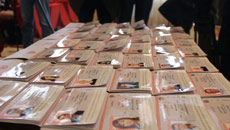Language, familiarity with Western culture and a willingness to move are the key reasons Indians are getting more top jobs in the US than the Chinese, who see more opportunity and good pay at home.
So suggests a Wall Street Journal report citing the success of chief executives such as PepsiCo's Indra Nooyi, Deutsche Bank's Anshu Jain and MasterCard's Ajay Banga and the recent appointment of India-born Satya Nadella as Microsoft CEO.
While "language and familiarity with Western culture are the obvious reasons" for their successes in the US, the Indians are also "more willing to move than Chinese", it says citing headhunters.
"Salaries for management positions at the director level in China are already $131,000 a year, almost the same as in Japan, and four times as much as in India, where executives at that level earn $35,000 on average," the Journal says analysing "Why China Doesn't Export World-Class CEOs".
Chinese pay is just one-fifth lower than the average level in the US, according to a survey of technology companies by Aon Hewitt, a human resource consulting company cited by the newspaper.
"While India remains a tough place to live, China has become more comfortable in recent years, ranking as the No.1 country for expatriates in an HSBC survey," it says.
Even those Chinese executives who move away to escape pollution and a slowing economy are more likely to land in Hong Kong or Singapore than get real international experience in markets such as Southeast Asia or Latin America, the Journal said.
"Fewer than 10 percent of Chinese job candidates on average would be suitable for work in a foreign company because of their poor command of English and an education system that focuses on theory rather than practical skills," it said citing a report by consulting firm McKinsey & Co.
But as China suffers from a shortage of top talent, despite its enormous pool of university graduates, with 7.3 million more expected in 2014, the Journal said state-owned enterprises and private companies are bidding for home-grown talent.
Thus "Western companies aren't always the employer of choice in China anymore", it says. "With so much attention lavished on the most promising executives in China, many feel their opportunities are greater at home than abroad."





